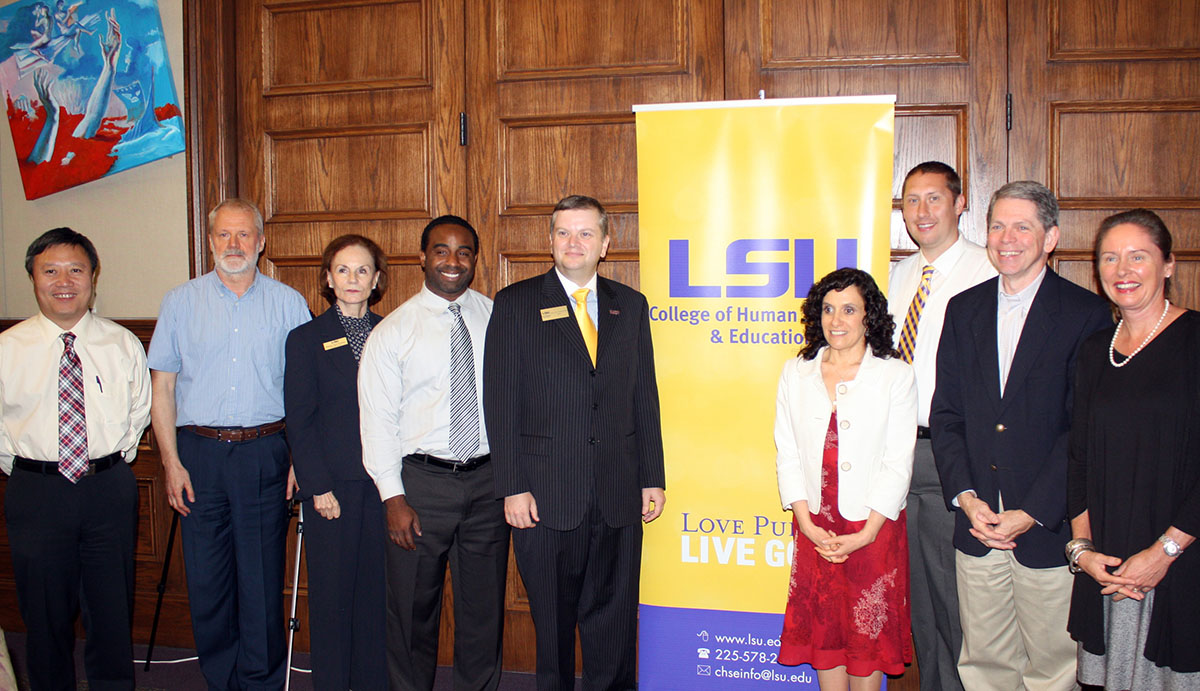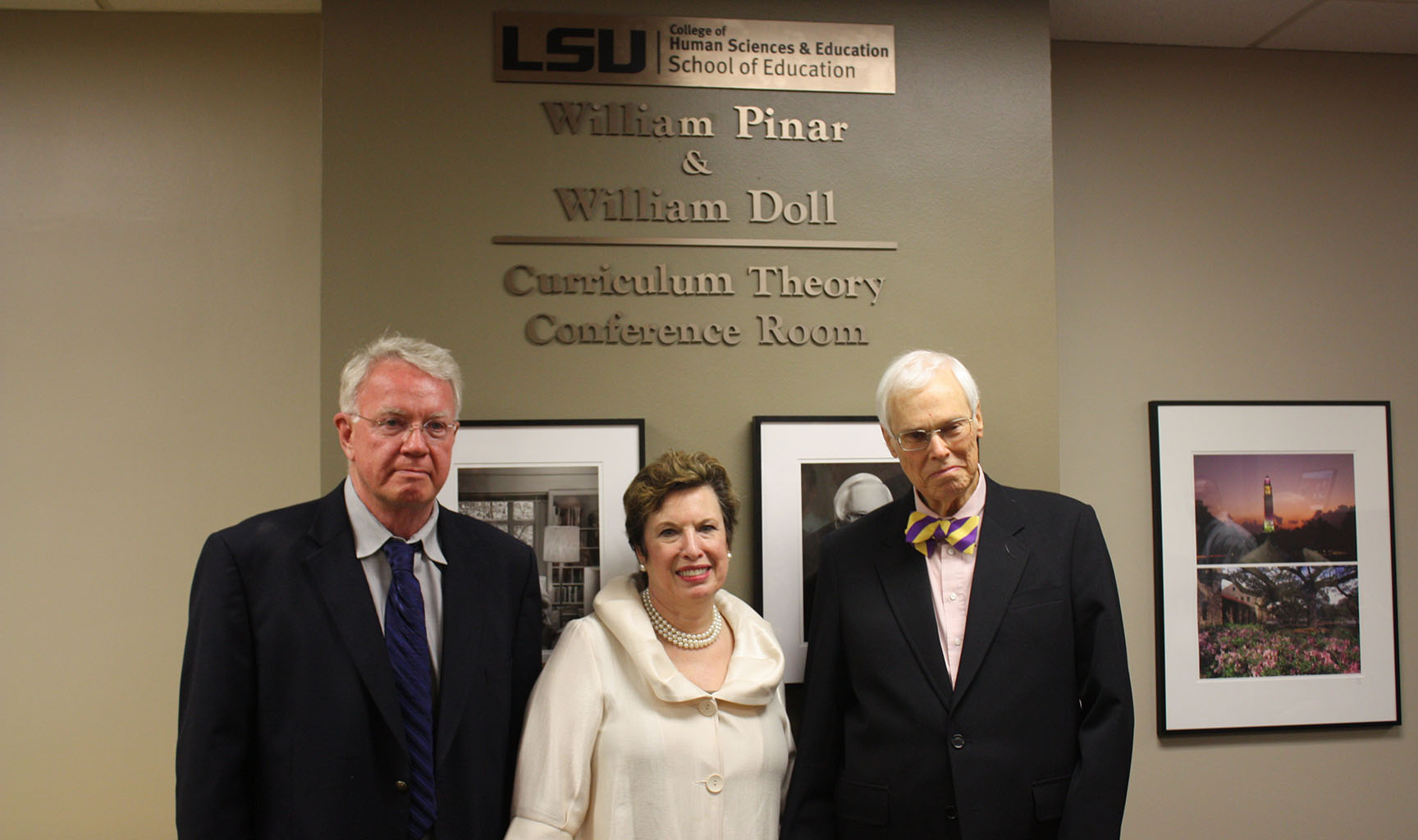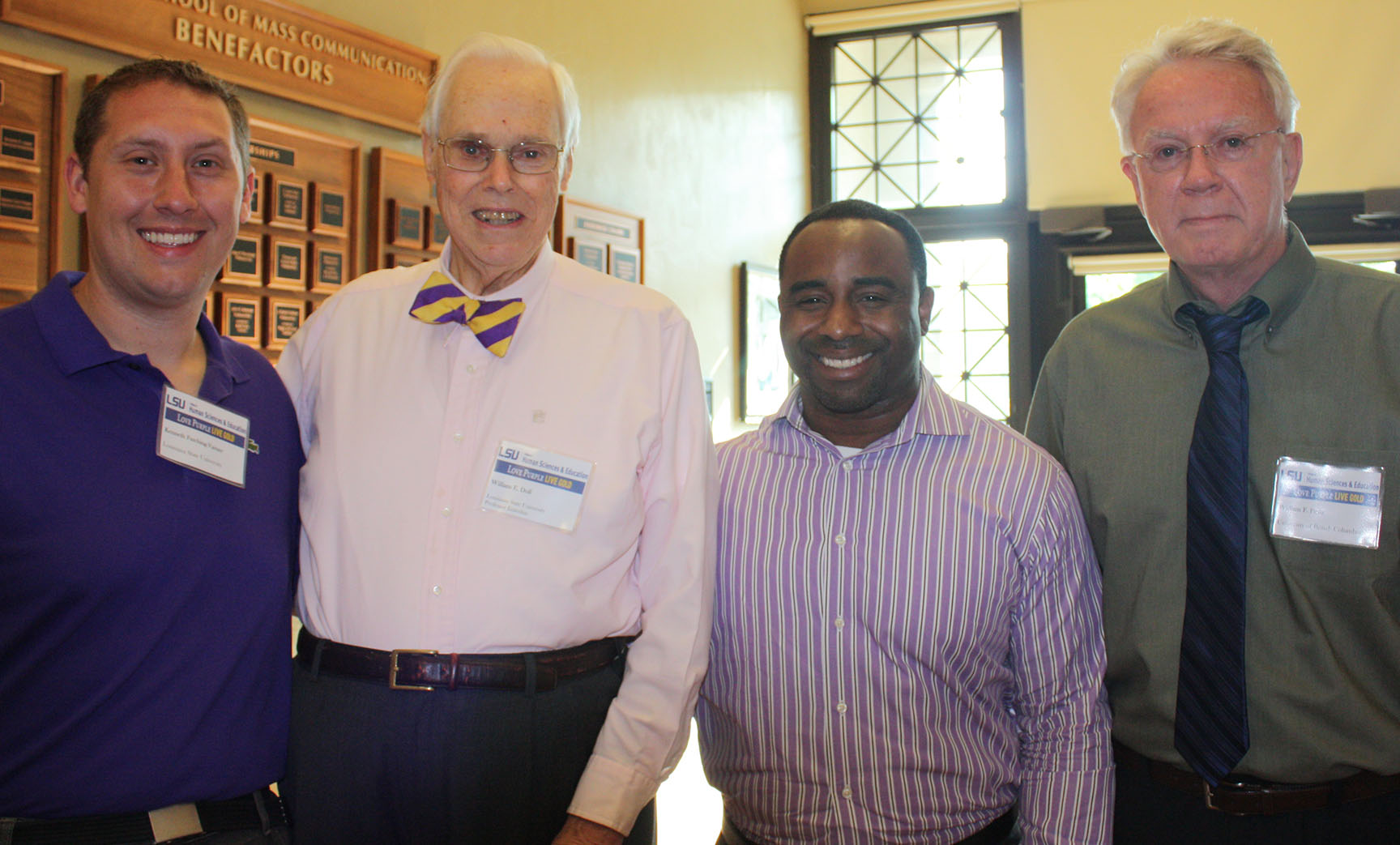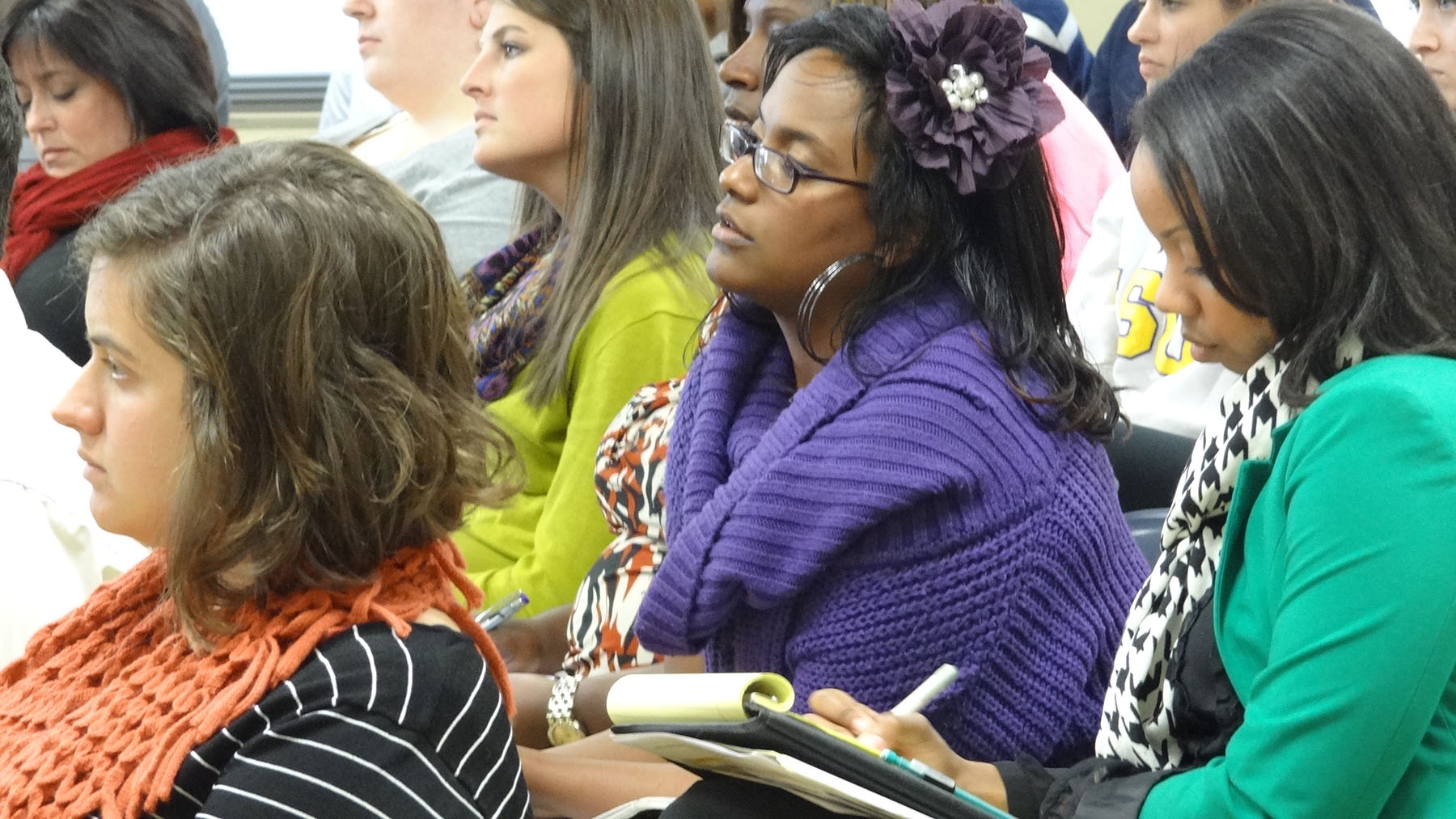December 2020
‘Tis the Season to Celebrate—The Curriculum Theory Project’s 25 Years
December 4, 2020
Authored by: Anita Dubroc, Sher Ahmed, and Cindy Ashley | LSU CTP doctoral students, Curriculum
Theory Graduate Student Collaborative officers
 LSU Curriculum Theory Project's Intenationalization Symposium in 2013.
LSU Curriculum Theory Project's Intenationalization Symposium in 2013.
The Curriculum Theory Project (CTP) advances research on the role of education, and its significance, in a democratic society, both nationally and internationally. As doctoral students engaged in curriculum theory—the interdisciplinary study of educational experience, directed largely via curriculum—and officers of The Curriculum Theory Graduate Student Collaborative (CTGSC); we have enjoyed the opportunity to participate in and contribute to CTP’s rich history, and join an inviting intellectual community that continues to give and to grow after 25 years.
Dr. William F. Pinar founded CTP in 1995. Drs. William F. Pinar and William E. Doll, Jr. served as co-directors, as Dr. Pinar notes: “to advance curriculum theory as a field of study and to underline LSU’s primary position in that field.”1 Curriculum theory invites us to think of education beyond teaching and learning. CHSE Dean and CTP faculty member, Dr. Roland Mitchell explains that it “asks the hard questions about what constitutes knowledge,…delves into relationships, not even what makes us human, but ultimately what connects us to the world.”
Striked Harp, Joined Chorus, Joyous Together, Hailing in the New
CTP students and faculty are dedicated to studying the factors influencing and altering
education practices around the world. Foundational research continues in areas embracing:
gender, race, poverty, cultural and media studies, critical pedagogy, and human resource
management and leadership; as well as advancing theories in feminism, new materialism,
narrative inquiry, poststructuralism, complexity and chaos sciences. We also maintain
a diverse array of programs, welcoming all faculty and students from across many disciplines
and departments, educational offerings through our: Lecture Series and Visiting Scholars,
Lunch & Learn Series, Professional Development Workshops, and CTP Socials, in addition
to Curriculum Camp.
This year, Dr. Rubén A. Gaztambide-Fernández from the University of Toronto inspired scholarly growth in sharing research for
his latest book: Between Self & Other: Relationality in Solidarity and Cosmopolitanism. As editor of Curriculum Inquiry, he mentored us on the politics of and paths to academic publishing. The conference
offers an encouraging place for students to practice presentation skills for larger
conferences. Other professional development offerings emphasized networking with faculty
members.




Taking up work that is both responsive and relevant in CTP, compelling conversations in the context of this global pandemic emerged through a zoom panel of authors from the forthcoming Corona Chronicles: Necessary Narratives in Uncertain Times2—and will continue in 2021 via a ‘volume two’ discussion. Our upcoming chat with invited scholar, Dr. Dave Stovall, critical race theorist and professor at the University of Illinois at Chicago, will address the call for “Abolition and the End of Curricular Violence” unique to this COVID moment. While always thinking to the futures and possibilities of curriculum theory, research, and education, the Curriculum Theory Project keeps connected to the local space through research projects and educational endeavors within LSU and the neighboring community. CTP offers a nurturing space for faculty and students to learn and grow from and with each other.
Donned Bright and Blazing Bough Before Us
CTP’s students are integral to its evolution and the faculty inspire us to take part in the curriculum conversation. Dr. Hendry, Professor Emerita, explains: “At the heart of these conversations were of course faculty, but it was the graduate students who sustained, challenged, and initiated these dialogues in ways that created communities upon communities of exchanges that have resulted in a rhizomatic3 network.”
"The doctoral seminar Bill Doll began during these early days which continued over a shared lunch each week—'Friday Friends’ he called it—is telling here, I think: so much of CTP has been and is about friendship, fellowship, cultivating community that is at once caring, critical and creative; intellectually dynamic and vibrant, living and loving fully, and this the world over,” said Dr. Molly Quinn, CTP alumna and current director.
We will take this celebrated CTP culture with us and spread its spirited wisdom and work in our respective countries and careers when we graduate too. We celebrate CTP on this occasion of its 25 magnanimous years.
 View the interactive map here.
View the interactive map here.
CTP has inspired its students to find their own way of learning, and through curriculum. Dr. Whitlock clarifies, “But, and this is the beautiful thing about the CTP. You brought what you had and crafted your own path.” Continuing, Dr. Nelson concludes: “We engaged in our ‘complicated conversations,’ and we were always learning by engaging intellectually with others in our meetings, classes, and other interactions. Social gatherings were academic events, too, filled with conversations and laughter shared with fellow faculty and with graduate students, who would become colleagues.” These colleagues now serve in different capacities at public and private schools, universities, non-profit organizations and other educational institutions across the globe.4
Dr. Hendry notes that they “challenged my notions of social change, research as method and the very concept of what constituted learning/education. Today, [many] of these students are all well-established scholars and leaders in the field of curriculum theory.”5 We will take this celebrated CTP culture with us and spread its spirited wisdom and work in our respective countries and careers when we graduate too. We celebrate CTP on this occasion of its 25 magnanimous years
Decked Halls of Historical Distinction
Drs. William F. Pinar and William E. Doll, Jr. founded CTP in 1995 with the support of Dr. Neil Matthews (Director, School of Education), as Dr. Pinar notes: “to advance curriculum theory as a field of study and to underline LSU’s primary position in that field.” Below are some milestones and remembrances of the CTP journey.
Professor Emerita, CTP’s former director and most long-standing faculty member, Dr. Petra Hendry observes: “Much of what we have done in terms of best practices is to develop relationships, work in community and build networks.”
CTP’s early years, focused on cultivating cross-cultural curricular conversation and collaboration, brought renowned scholars6 to the University through lecture series7 and international conferences, which inspired its students and faculty to always look beyond their home in Peabody Hall (with travels to China too). The project hosted a number of conferences, among them—the 1999 Curriculum Theory-Philosophy of Education Conference; and the 2000 Internationalization of Curriculum Conference, where the International Association for the Advancement of Curriculum Studies (IAACS) and its American affiliate (AAACS) were also launched.
Professor emerita Dr. Nancy Nelson remembers: “I greatly valued these … conference experiences in large part because they provided a way to stay in touch with curriculum theory colleagues and their work, [when] I was no longer at LSU.”
Such engagement endures in CTP, particularly through its international faculty and students and visiting scholars, and study abroad program in Chile8 too. Although they may find their professional homes in faraway places, former faculty and alumni have also returned to LSU through CTP’s programming and events.
Many do so through Curriculum Camp (CC), an annual graduate student conference hosted by the CTGSC, and central offering of CTP. Spearheaded by Dr. Doll in 1992, faculty have recalled that students and faculty used to gather together around the fire at a campsite to talk about their research. Such continues through our featured “fireside chat” from an invited scholar9 at the conference, albeit now on campus, each year.
“By coming… we can continue that tradition of inquiry, of intellectual conversation,” CTP alumnus Steve Triche reflects. “It’s amazing… always every single year…,” alumna Maria Wallace adds: “to be challenged to think differently about the world and the way we make meaning about the world we live in.”
Professor Emerita, CTP’s former director and most long-standing faculty member, Dr. Petra Hendry10 observes: “Much of what we have done in terms of best practices is to develop relationships, work in community and build networks.”
Such has meant local contributions, then, too. McKinley High School, just blocks away from LSU’s North Campus, became the first site for the Old South Baton Rouge Project Dr. Hendry initiated, collecting oral histories from 1999-2006, begun in community-based partnership with LSU doctoral and McKinley High school students.11 Dr. Mitchell12 led CTP in addressing recruitment of African-Americans, involvement in the African American Summit[1] , and collaborative endeavors for racial justice. Today, programs like Humanities Amped13 , empowering teachers and youth via critical literacy, and CTP’s development of the Urban and Community Education Certificate in 2017,14 celebrating its first graduates this past year, reflect these ongoing commitments as well.
1Both men, former LSU faculty and CTP co-directors and renowned scholars in the field of curriculum theory, received lifetime achievement awards by the American Educational Research Association’s Division B, Curriculum Studies (2000 and 2005, respectively).
2 Panelists included former CTP faculty, Dr. Kenny Fasching-Varner (also an editor on the project) and Dr. Steve Bickmore (and contributing author), both now of University of Nevada, Las Vegas; as well as Drs. Hendry and Mitchell, also contributing authors
3A concept, analogous to the plant sending out roots and shoots in all directions, drawn from: Deleuze, G., & Guattari, F. (2004). A thousand plateaus: Capitalism and schizophrenia. London: Continuum.
4Learn more about CTP alumni via this interactive map.
5Those students, now alumni, serve in various notable positions at various higher education institutions, schools and non-profit organizations, to name but a few such as: Patrick Slattery (1989), Neari F. Warner (1992), Natalie Adams (1994), Denise Talifero Bazile (1998), Hongyu Wang (2001), Stephen Triche (2002), Brian Casemore (2005), Nicholas Ng-A-Fook (2006), Brad Petitfils (2012), Kirsten. T. Edwards (2012), Paul Eaton (2015), Michaela P. Stone (2019) and Danielle Klein (2020).
6e.g., Michel Serres (France), Shigeru Asanuma (Japan), David Jardine (Canada), Eero Ropo (Finland), Gert Biesta (Netherlands), Ivor Goodson (UK), Noel Gough (Australia), Hua Zhang (China), and José Pacheco (Portugal).
7Featured lecturers included: Michael Apple, Cleo Cherryholmes, Maxine Greene, Madeleine Grumet, Philip Jackson, Bill Watkins, Ian Westbury, Dwayne Huebner, Evelyn Tucker, David Griffin, Thomas Berry and others.
8e.g., former CTP faculty Jacques Daignault, Claudia Eppert, and Nina Asher; and visiting scholars, some of whom are noted in footnote 2. Dr. Kenny Fasching-Varner, former CTP faculty member involved in its direction, established the study abroad program in Chile, and contributed much to international efforts and recruitment involving both scholars and students at LSU.
9Curriculum Camp has featured notable invited scholars including: Nel Noddings, Cameron McCarthy, Janet Miller, Elaine Richardson, and Cynthia Dillard, among many others.
10Hendry’s contributions to the mission of CTP have been numerous and noteworthy. She, too, has been recognized with AERA’s Lifetime Achievement Award (Division B, Curriculum Studies), in 2016.
11This community carries an important place in Baton Rouge’s history, including local civil rights activity. The interviews gathered herein culminated in Old South Baton Rouge: The Roots of Hope, a history published in 2009.
12Collaborating as faculty as well, Drs. Hendry and Mitchell, with Dr. Paul Eaton, a CTP alumnus, recently published Troubling method: Narrative research as being (2018), a book examining methodology and epistemology in novel ways.
13 Dr. Sue Weinstein, CTP Affiliate Faculty Member in LSU’s English Department, has played a central role in this work.
14CTP faculty member Dr. Petra Robinson was instrumental in launching this program, with CTP faculty Drs. Jackie Bach (former CTP director, now CHSE Associate Dean) and Kerri Tobin, serving as its advisors.